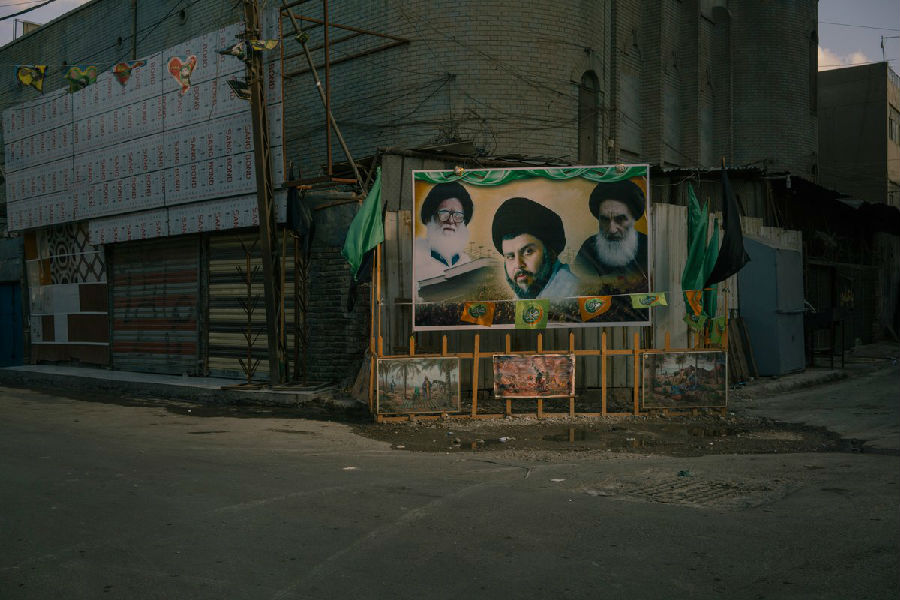战后生活
Fifteen years on from the U.S. invasion and with ISIS in retreat, Iraq is trying to build a peace that lasts
美国入侵15年后,随着ISIS的撤退,伊拉克正努力建设一个持久和平的伊拉克
By Vivienne Walt/Baghdad
文/(巴格达)薇薇恩·沃尔特
On a crisp afternoon in late winter,
在隆冬时节一个清爽的午后,
Bassem Qassim, a 55-year-old militia fighter, drives past a checkpoint on the edge of Baghdad,
55岁的民兵巴西姆·盖西姆开车驶过巴格达边界的一个检查站,
where the city’s clogged traffic gives way to sheep grazing and villagers tending small crops next to their houses.
这里没有了城市堵塞的交通,只有放牧的羊群和村民房前屋后的小片庄稼地。
A couple of dozen miles farther, he stops the car in a tiny hamlet
盖西姆继续开出几十英里后把车停在了一个小村庄里,
to show how perilously close the Islamic State came to taking the Iraqi capital during its stampede into the country in 2014.
随后他向我们展示了ISIS2014年涌入伊拉克时如何距离攻陷伊拉克首都仅差一步之遥。
He points to a cluster of trees on the edge of a small community.
他指着一个小村落边缘的一片小树林,
"They were right here,” says Qassim, who fought a fierce battle against the jihadists for 3.5 years.
说到,“他们都已经到那儿了,”他曾与圣战分子激战了三年半之久。
This was our line of defense."
“我们的防线就设在这儿的。”
The sleepy dot on the map does not look like a war front.
地图上那个沉睡的点看着并不像什么前线。
And yet, after years of conflict, countless fault lines like this crisscross Iraq,
然而,经过多年的混战,伊拉克境内这种壕沟已经到处都是,连数也数不清了,
leaving riven communities and millions of upturned lives in their wake.
社区因此变得四分五裂,数以百万计的百姓的生活也随之发生了天翻地覆的变化。
Now, as the country digs out from its grueling war against ISIS,
如今,该国终于从与ISIS的严酷战争中抽出身来了,
it is trying to forge from its victory a lasting peace
它正努力在战争胜利后创建一个持久和平的国家,
for the first time since the U.S. led a military invasion of Iraq in March 2003, in defiance of the U.N., to overthrow the autocrat Saddam Hussein.
这还是自2003年3月美国无视联合国,率领军队入侵伊拉克以推翻萨达姆·侯赛因的独裁统治以来,该国首次做出这样的举措。
Fifteen years on, TIME returned to Baghdad to speak to Iraqis of almost every stripe,
十五年过去了,此次,本刊记者重返巴格达,采访了各个阶层的伊拉克人,
from battle-hardened fighters and grieving civilians to Prime Minister Haider al-Abadi.
从久经沙场的士兵,到悲伤的平民,到总理海德尔·阿巴迪。
All are trying to determine how they can finally prosper, and whether this relative calm can last.
所有人都想知道他们究竟要怎样才能重振旗鼓,想知道这种相对的平静能否持续。

Having all but obliterated ISIS’s caliphate, Iraqis are grappling with a question that had largely receded during years of fighting,
除了被消灭的ISIS哈里发之外,伊拉克人正在努力解决一个在多年的战争期间很大程度上已经退到幕后的问题,
and that now looms large over the parliamentary elections scheduled for May 12:
这一问题也将成定于5月12日举行的议会选举的一个主要问题:
Can their country emerge as a functioning democracy, with its Shi'ite, Sunni and Kurdish populations relatively united?
他们的国家能否成为一个运转正常,什叶派,逊尼派和库尔德人口相对团结的民主国家?
And can it do that without the safety net of the U.S. military?
伊拉克能否在不依靠美国的安全网的情况下做到这一点?
If it succeeds—and it is a big if—
如果做到了 - 这是一个很大的假设-
Iraq could become that beacon of freedom that U.S. officials once promised 15 years ago, in arguing for a war many now regard as a disastrous decision.
她将成为一座自由的灯塔,一座15年前美国官员为发动战争,这场战争被当今很多人都视为灾难性的决定,辩解时就曾许诺他们的自由灯塔。
"We have sacrificed a great deal of blood and treasure for the future of Iraq,” says Lieut. General Paul Funk, the top U.S. commander in the country.
“我们为伊拉克的未来牺牲了大量的生命和财富,”美国最高指挥官,陆军中将保罗·芬克说到。
He believes that under ideal circumstances, Iraq could act as a multiethnic buffer between the region’s bitter rivals,
他认为,在理想的情况下,伊拉克可以在该地区激烈竞争的两大对手之间扮演一个多民族缓冲器,
both of which are Iraq’s neighbors: Shiite-dominated Iran and Sunni-dominated Saudi Arabia.
这两大对手都是伊拉克的邻国:一个是什叶派主导的伊朗,一个是逊尼派占主导地位的沙特。
"I see in Iraq the future of the Middle East," he says.
“我觉得中东的未来在伊拉克,”他说。
Yet if Iraq fails and slips back into conflict, the country could again play host to the region’s violent proxy wars—
然而,如果伊拉克重振失败并再次陷入冲突的话,该地区残酷的代理人战争可能会再次在伊上演——
potentially embroiling the U.S. in a yet another protracted engagement.
美国也可能再次卷入一场旷日持久的战争。
Already, ISIS survivors have begun to launch attacks, and Iraqi leaders believe that they are attempting to regroup.
目前,ISIS余孽已经开始发动进攻了,伊拉克领导人认为这些人正在试图重新集结起来。
No country can withstand such onslaught,” al-Abadi tells TIME.
“没有哪个国家能够承受这种攻击,”阿巴迪告诉《时代周刊》。
译文由可可原创,仅供学习交流使用,未经许可请勿转载。


